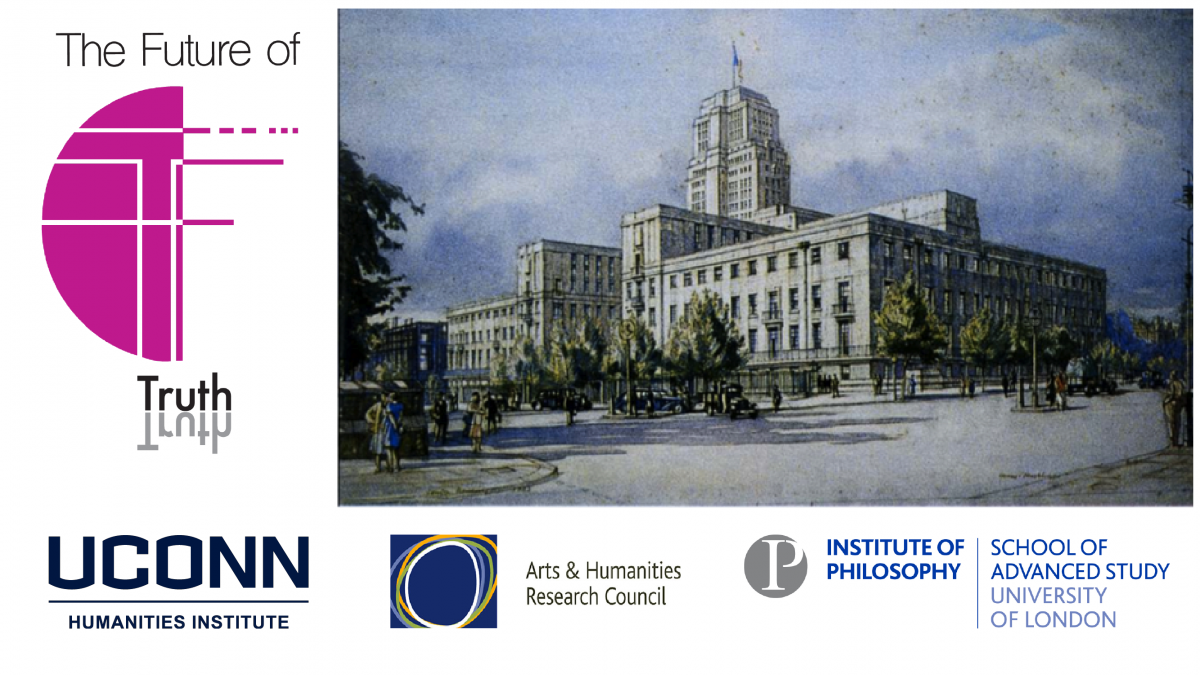The University of Connecticut Humanities Institute (UCHI), through its latest initiative—The Future of Truth—is co-sponsoring a global conference entitled “Under Pressure: Truth, Trust and Democracy.” In light of the election of Donald Trump in the United States and the ongoing Brexit gridlock in the United Kingdom, this conference, which takes place at the Senate House, University of London on November 28–29, 2019, brings together well known scholars from around North America and Europe to examine two broad themes: “Truth and Bias in Images,” and “Truth, Propaganda, and Public Discourse.” Participants of the conference include UCHI director and UConn Board of Trustees Distinguished Professor, Michael P. Lynch. Other sponsors of this conference include: Institute of Philosophy – School of Advanced Study, University of London, and the United Kingdom Arts and Humanities Research Council.
Author: Siavash Samei
You Should…Listen to: Regina Spektor’s Music (Sarah Willen-Anthropology)
 You should listen to Regina Spektor’s music — but only if you’re ready for a brush with genius. Wild genius, that is, skyrocketing musically through the magical, heartbreaking, infuriating, absurd journey that is life. Nothing is lyrically off limits for Spektor — no topic too grand (“Laughing With”), no predicament too small (“Dance Anthem of the 80s”) to stir her imagination. A classically trained pianist (“Après Moi”), mediocre guitarist (“That Time”), and proud immigrant to the United States — when she and her family emigrated from the Soviet Union in 1990, with support from HIAS, she was just 9 1/2 — Spektor belongs to a cadre of gifted artists (Gary Shteyngart is another) for whom American promise, Jewish otherness, Russian melancholy, and familial closeness meld in a worldview that is wise (“Samson”), joyful (“On the Radio”), and occasionally bizarre (“Pavlov’s Daughter”). Whether she’s loving on New York City (“Don’t Leave Me (Ne Me Quitte Pas)”), mourning an impossible love (“Better”), parodying Second Amendment fetishism (“Uh-Merica”), dreaming up the baby boy whose clothes she’ll someday pin funkily at the beach (“Folding Chair”), or shredding the high priests of exploitation, greed, and unctuous politics (“The Trapper and the Furrier”; “Ballad of a Politician”), Regina Spektor’s America is a place we all should visit, and linger. Oh — and I hear she wrote the theme song for “Orange is the New Black.” Is it worth watching?
You should listen to Regina Spektor’s music — but only if you’re ready for a brush with genius. Wild genius, that is, skyrocketing musically through the magical, heartbreaking, infuriating, absurd journey that is life. Nothing is lyrically off limits for Spektor — no topic too grand (“Laughing With”), no predicament too small (“Dance Anthem of the 80s”) to stir her imagination. A classically trained pianist (“Après Moi”), mediocre guitarist (“That Time”), and proud immigrant to the United States — when she and her family emigrated from the Soviet Union in 1990, with support from HIAS, she was just 9 1/2 — Spektor belongs to a cadre of gifted artists (Gary Shteyngart is another) for whom American promise, Jewish otherness, Russian melancholy, and familial closeness meld in a worldview that is wise (“Samson”), joyful (“On the Radio”), and occasionally bizarre (“Pavlov’s Daughter”). Whether she’s loving on New York City (“Don’t Leave Me (Ne Me Quitte Pas)”), mourning an impossible love (“Better”), parodying Second Amendment fetishism (“Uh-Merica”), dreaming up the baby boy whose clothes she’ll someday pin funkily at the beach (“Folding Chair”), or shredding the high priests of exploitation, greed, and unctuous politics (“The Trapper and the Furrier”; “Ballad of a Politician”), Regina Spektor’s America is a place we all should visit, and linger. Oh — and I hear she wrote the theme song for “Orange is the New Black.” Is it worth watching?
– Sarah Willen
Associate Professor of Anthropology
University of Connecticut
 Who is Sarah Willen? Sarah Willen is an Associate Professor of Anthropology at the University of Connecticut and Director of the Research Program on Global Health and Human Rights at the university’s Human Rights Institute. She holds a PhD in Anthropology and an MPH in Global Health, both from Emory University. She is a two-time recipient of the Rudolf Virchow Prize from the Critical Anthropology of Global Health Caucus of the Society for Medical Anthropology. She is also the author of a 2019 book Fighting for Dignity: Migrant Lives at Israel’s Margins published by the University of Pennsylvania Press.
Who is Sarah Willen? Sarah Willen is an Associate Professor of Anthropology at the University of Connecticut and Director of the Research Program on Global Health and Human Rights at the university’s Human Rights Institute. She holds a PhD in Anthropology and an MPH in Global Health, both from Emory University. She is a two-time recipient of the Rudolf Virchow Prize from the Critical Anthropology of Global Health Caucus of the Society for Medical Anthropology. She is also the author of a 2019 book Fighting for Dignity: Migrant Lives at Israel’s Margins published by the University of Pennsylvania Press.
Fellows Talk: Hayley Stefan on Black Feminist Epistemologies and Reparative Justice
Black Feminist Epistemologies & Reparative Justice
Hayley Stefan, Ph.D. Candidate in English, University of Connecticut
November 13, 2019 – 4 to 5PM (UCHI Conference Room: Babbidge Library, 4th Floor South)
Hayley’s work examines how cultural reactions to national traumas evaluate embodied experience. In her talk, she will focus on the long refusal to recognize anti-Black oppression and violence as national tragedies. Black Feminist epistemologists such as Patricia Hill Collins, bell hooks, and Safiya Umoja Noble argue that reparative and restorative justice must value the Black body. This talk brings together legislation, literature, and digital archives to show how Black activists and scholars have used different methods to authorize Black knowledge. These artifacts suggest that reckoning with Black trauma means embracing communal knowledge and privileging the emotional and embodied effects of daily atrocities.
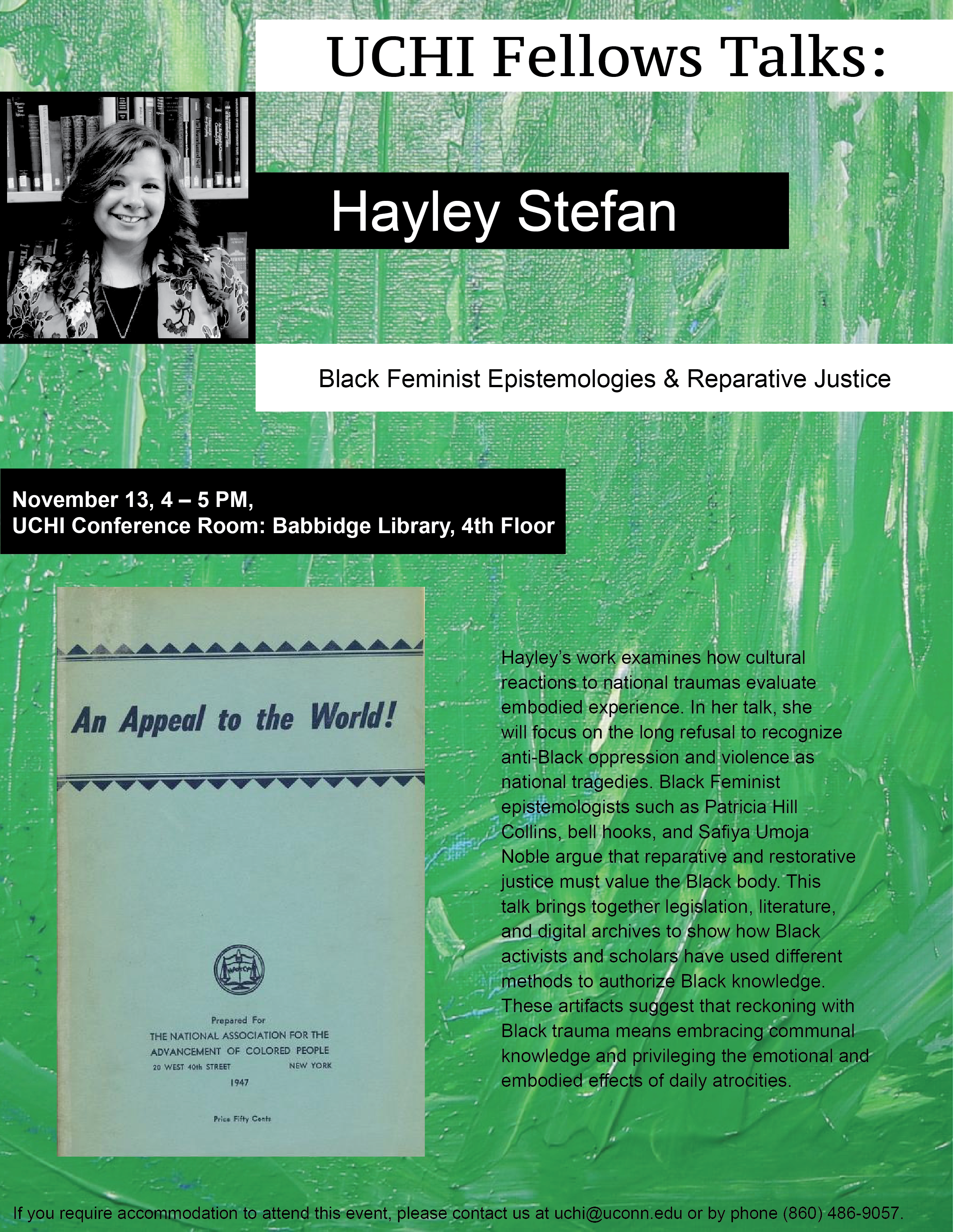
Johannes Heil Upcoming Talk at UConn Explores “the pre-Rabbinic Western Jewish Tradition”
Professor Johannes Heil, President of the Hochschule für jüdische Studien Heidelberg (Academy for Jewish Studies), presents a lecture which challenges the assumption of the widespread decline of Jewish diasporic culture after 70 C.E., which is based on limited archaeological and epigraphic evidence. This lecture focuses instead on the textual culture of Western diasporic Judaism during the centuries before the reception of Rabbinic Judaism, roughly from the 4th to the 9th century, and paints a different picture of a vibrant Jewish culture in Western Europe. An event of the Center for Judaic Studies and Contemporary Jewish Life, co-sponsored by the UConn Humanities Institute, the Department of Literatures, Cultures, and Languages, and the Medieval Studies Program. If you require an accommodation to participate, please contact Pamela Weathers at 860-486-2271 or pamela.weathers@uconn.edu.
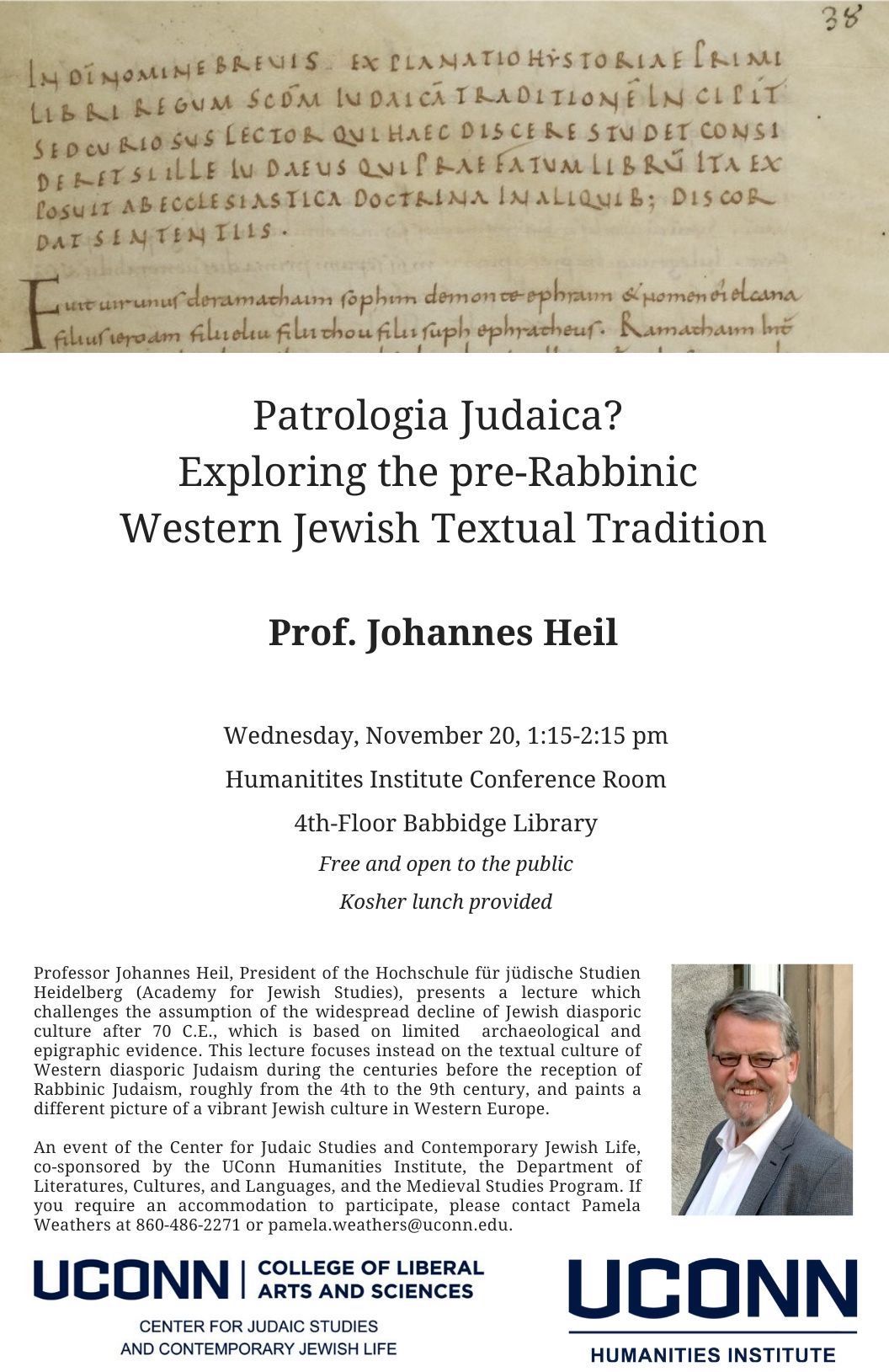
The Future of Truth Co-sponsor of Three Events on November 5
On Tuesday, Nov. 5, the Science of Learning & Art of Communication program (SLAC) and the UConn Humanities Institute’s The Future of Truth Initiative (UCHI-TFoT) invite you to three special events. Please register for any you are interested in so that we can provide appropriate refreshments.
(1) SCIENCE AND IMAGINATION WORKSHOP
- 3-6pm, UConn Humanities Institute Conference Room, 4th Floor, Babbidge Library
- Featuring Michael Lynch, Tim Miller, and Susan Schneider from UConn, and Julie Sedivy (U. Calgary) and Mike Tanenhaus (U. Rochester)
- Flyer attached; see details and register here
- Dinner with the speakers will follow for a limited number of guests; if you would like to join for dinner, please register here, and we will send you details
(2) CULTIVATING SCIENTISTS AS AUTHORS: REWARDS, CHALLENGES, AND TECHNIQUES
- 10-11:30am, UConn Humanities Institute Conference Room, 4th Floor, Babbidge Library
- Light breakfast from 9:30
- Led by Julie Sedivy (U. Calgary)
- This is an interactive session for scientists who are interested in writing for general audiences, whether in the form of blogs, articles, books, or other media. We will discuss some of the practical aspects of learning to write for a nonacademic audience and of accessing channels for disseminating your writing more broadly. We will also address some of the obstacles experienced by scientists who would like to invest time and energy into science communication. We’ll explore the supports that scientists need from inside and outside their institutions and the potential payoffs of such investments for individual scientists and their institutions.
- Please register for this writing workshop here
(3) SCIENCE — THE ENDLESS FRONTIER: DISCUSSION & WORKING LUNCH
- 12-2PM, UConn Humanities Institute Conference Room, 4th Floor, Babbidge Library
- Led by Mike Tanenhaus (U. Rochester, 2018 winner of the Rumelhart Prize)
- Participants should read the report ‘Science — the Endless Frontier‘ (which led to the founding of the National Science Foundation), in advance of the meeting. Mike’s talk at the Science and Imagination afternoon event focuses on this report (see his abstract here). Our working lunch will give you an opportunity to do a “deep dive” into this report with Mike. If time permits, we will talk about ways we can impact public support for science locally, nationally, and globally.
- Click here to register for this discussion and lunch with Mike Tanenhaus
UConn Faculty and Graduate Students Among UNH-Mellon Grant Winners
University of New Hampshire (UNH) Center for the Humanities announced the names of its 2019 Summer Institute in Public Humanities seed grant winners. The seed grant was funded by The Andrew W. Mellon Foundation. UNH is a member of the New England Humanities Consortium, of which the University of Connecticut Humanities Institute (UCHI) is a founding member and current executive and administrative hub. Among the winners are two UConn faculty members and one graduate student:
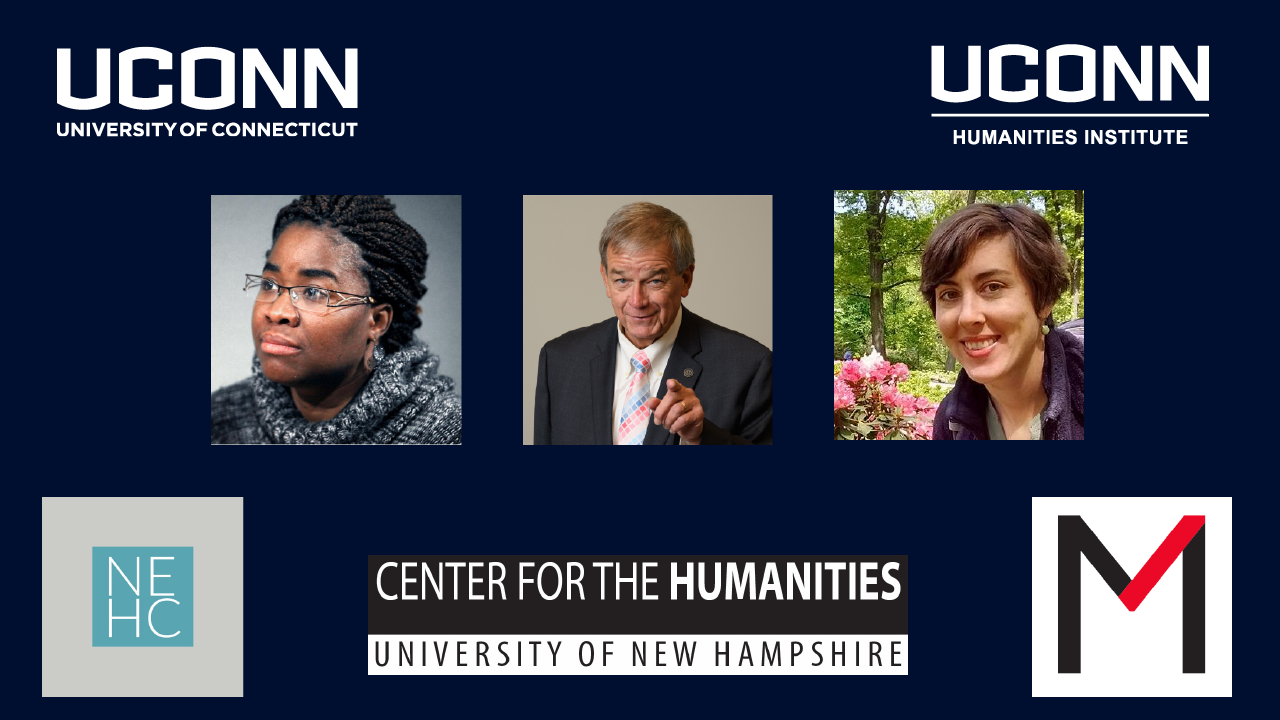
Megan Fountain, UConn graduate student pursuing a Master of Arts in Latino and Latin American Studies
“The Guatemala-Connecticut Community History Project”
Documenting and archiving oral histories of Guatemalan immigrants and their families in Guatemala
Community Partners: A committee of Guatemalan immigrants and community activists including Unidad Latina en Accion (ULA), a grassroots organization; a team of public historians and New Haven Public Schools teachers; Columbia Center for Oral History Research; and Groundswell: Oral History for Social Change.
Fiona Vernal, UConn associate professor of history
“A Caribbean Museum”
Community-based archival collecting to lead to an oral history initiative including one-week traveling pop-up exhibits, a migration exhibit to launch the Caribbean Museum, and salons (panel discussions) about public housing, mobility, and migration
Community Partners: Connecticut Humanities Council (CHC), The Hartford History Center at the Hartford Public Library, The West Indian Social Club (WISC), and El Instituto: The Institute of Latino, Caribbean and Latin American Studies (ELIN) at UConn, Hartford Public Schools, CREC (Capital Region Education Council)
Walter Woodward, UConn associate professor of history and Connecticut State Historian
“Doing Public Humanities: An Audio Field Guide”
A multi-episode web-based podcast as an audio roadmap into how to practice engaged public humanities
Community Partners: case history participants (faculty doing public humanities)
Fellows Talk: Nathan Braccio on Indigenous and Colonial Landscapes of New England
Parallel Landscapes: Algonquian and English Spatial Understandings of New England, 1500-1700
Nathan Braccio, Ph.D. Candidate in History, University of Connecticut
November 6, 2019 – 4 to 5PM (UCHI Conference Room: Babbidge Library, 4th Floor South)
Nathan’s talk will explore the ways in which Algonquian knowledge of the landscape represented a powerful and persistent alternative to English surveying and mapmaking in New England. When English colonists and explorers recognized the unsuitability of their techniques for understanding New England’s unfamiliar landscape, they tried to appropriate Indigenous knowledge and maps. Algonquian sachems (community leaders), used this as an opportunity to manipulate and benefit from their new English neighbors. For both colonizers and Indigenous people, maps became a potent tool in the struggle to define New England’s landscape.
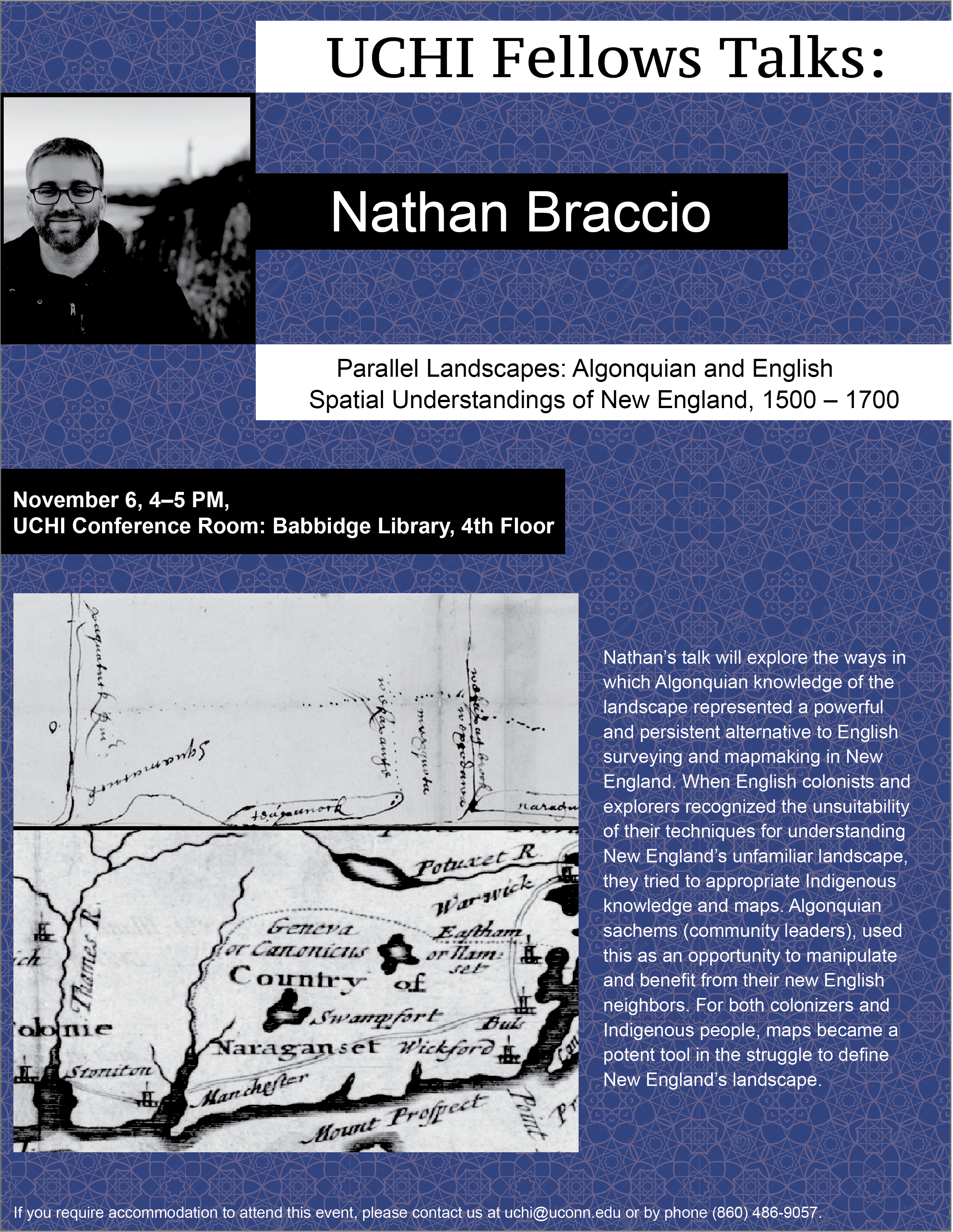
UCHI Co-Sponsor of First Biennial Expression, Language, Music Conference
The University of Connecticut Humanities Institute (UCHI) is co-sponsor of the first biennial conference on Expression, Language, and Music (ELM) at UConn. The Conference, which will take place on May 13–15, 2020, will be hosted by UConn’s Expression, Communication, and Origins of Meaning Research Group (ECOM), and will take place at The Lyceum in Hartford, Connecticut. Abstracts are due on December 9, 2010. Abstracts are welcome on a range of topic, including expression of emotions through speech, gesture, dance, and music, evolution of communication, meaning and structure in language and music, music cognition (including developmental and comparative perspectives), psychology/neuroscience of speech perception/production, philosophy of music, ‘Musical Protolanguage’. Abstracts should be accessible to an interdisciplinary audience that includes researchers who share interests with the conference themes. Preference will be given to abstracts that attempt to connect at least two of the three areas in the conference overarching themes (Expression, Language, Music).Please see below for more details.
Other sponsors of the ELM Conference include UConn’s Office of the Vice President for Research, College of Liberal Arts and Sciences, and the Connecticut Institute for the Brain and Cognitive Sciences. The Conference’s core program committee is chaired by Professor Dorit Bar-On who was a Class of 2018–19 faculty fellow at UCHI.

Fellows Talk: Joe Ulatowski on Epistemic Gatekeeping
Epistemic Gatekeeping, Pride or Prejudice?
Joseph Ulatowski, Senior Lecturer of Philosophy, The University of Waikato – New Zealand
October 23, 2019 – 4 to 5PM (UCHI Conference Room: Babbidge Library, 4th Floor South)
The continuous growth of intellectual ecosystems leads to an environment populated by mutually uncomprehending hyperspecialised groups. That there are such groups can be taken, quite rightly, to reflect the way that human knowledge has expanded and deepened to such an extent that one person can only have a detailed grasp of a very narrow field. People no longer specialise in medicine and law but hyperspecialise in endocrinology and patent law. They occupy a niche that has its own epistemic standards and only those hyperspecialists make appropriate use of its standards. Enter gatekeepers whose sole responsibility it is to assist new entrants to navigate these standards, so that novices not be left stranded upon remote cognitive islands. Whilst they may be highly skilled practitioners, epistemic gatekeepers are not free from acting upon their own cognitive biases and prejudices. In this excerpt from my project, Why Facts Matter, I argue that facts should serve against not only stranding novices on cognitive islands but also privileging biased gatekeepers.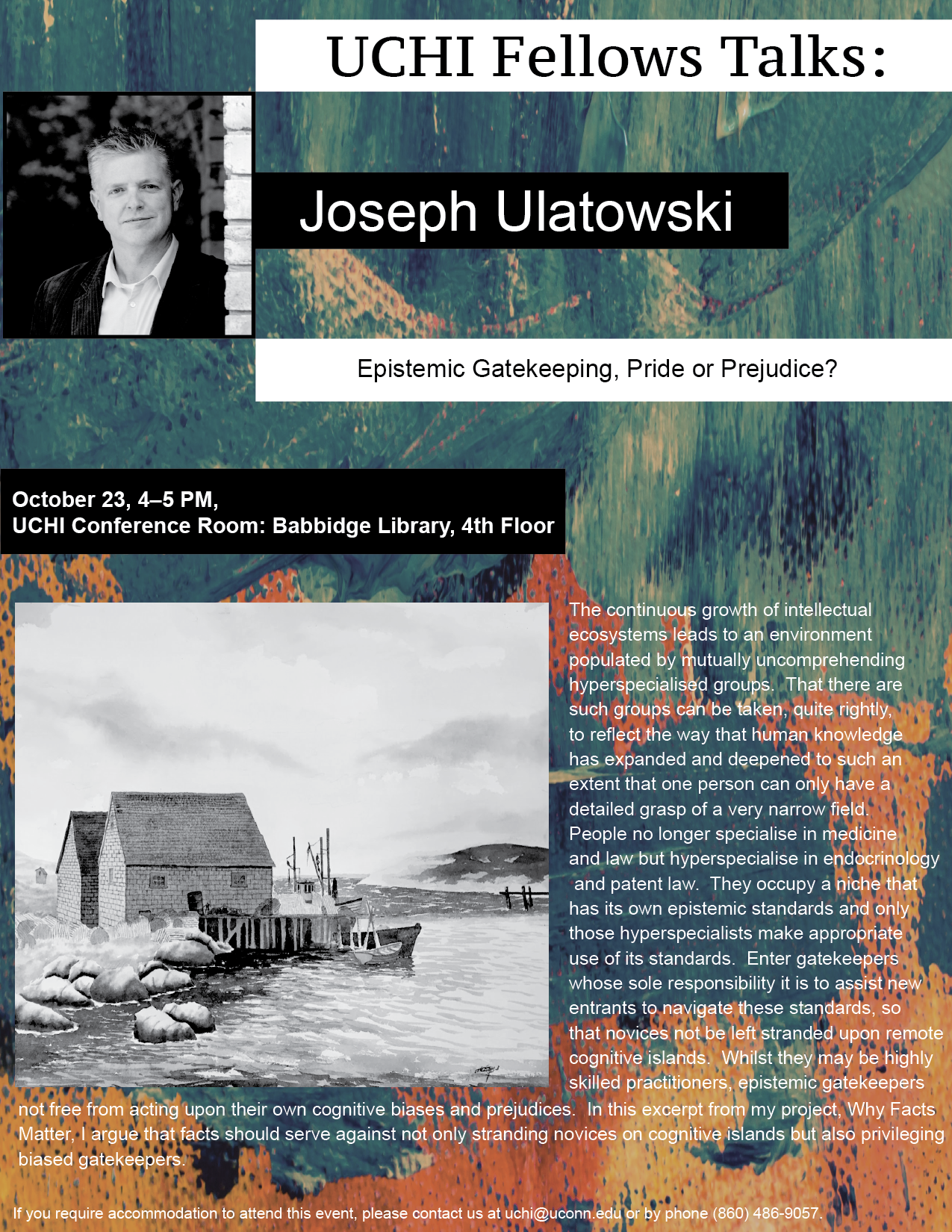
You Should…Read: Kalanithi’s “When Breath Becomes Air,” and Gawande’s “Being Mortal,” (Sara Harrington-UConn Library)
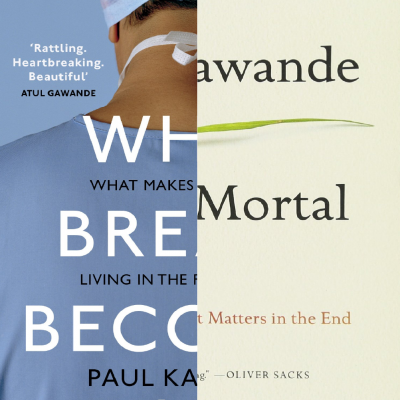 If medicine is an art as much as a science, then a journey of illness through the medical world is part humanistic voyage. Two books published in the last few years—When Breath Becomes Air by Paul Kalanithi (2016) and Being Mortal by Atul Gawande (2017)—call upon our deepest and truest humanity, and you should read them in tandem. In When Breath Becomes Air physician becomes patient; in Being Mortal physician becomes fellow traveler on a paternal medical odyssey. Each narrative is an exercise in heartache, gut punch, intellectual puzzle, moral quandary, and finally, existential ‘what if?’ My mind returned these texts over and over since I read them, inspiring me to wrestle anew with the medical journeys that I have traveled in the past and will no doubt walk in the future. I’m a librarian, so people ask me for reading recommendations all the time, and I’m always happy to share my working shortlist. The impact of When Breath Becomes Air and Being Mortal lingers and lasts, and you should read them for yourself.
If medicine is an art as much as a science, then a journey of illness through the medical world is part humanistic voyage. Two books published in the last few years—When Breath Becomes Air by Paul Kalanithi (2016) and Being Mortal by Atul Gawande (2017)—call upon our deepest and truest humanity, and you should read them in tandem. In When Breath Becomes Air physician becomes patient; in Being Mortal physician becomes fellow traveler on a paternal medical odyssey. Each narrative is an exercise in heartache, gut punch, intellectual puzzle, moral quandary, and finally, existential ‘what if?’ My mind returned these texts over and over since I read them, inspiring me to wrestle anew with the medical journeys that I have traveled in the past and will no doubt walk in the future. I’m a librarian, so people ask me for reading recommendations all the time, and I’m always happy to share my working shortlist. The impact of When Breath Becomes Air and Being Mortal lingers and lasts, and you should read them for yourself.
– Sara Harrington
Associate University Librarian for Academic Engagement
University of Connecticut
Who is Sara Harrington? Sara Harrington previously worked at the Ohio University Libraries and the Rutgers University Libraries. Sara holds a Ph.D. in Art History, an M.L.S., an M.Ed. in Higher Education, and a post-graduate certificate in the Curation and Management of Digital Assets. Sara works to integrate academic research libraries into university teaching, researching, and learning, building collaborations with stakeholder communities to support student and faculty success. Sara joined the UConn Library in 2018, and is enjoying getting to know New England across the course of all four of its beautiful seasons.
